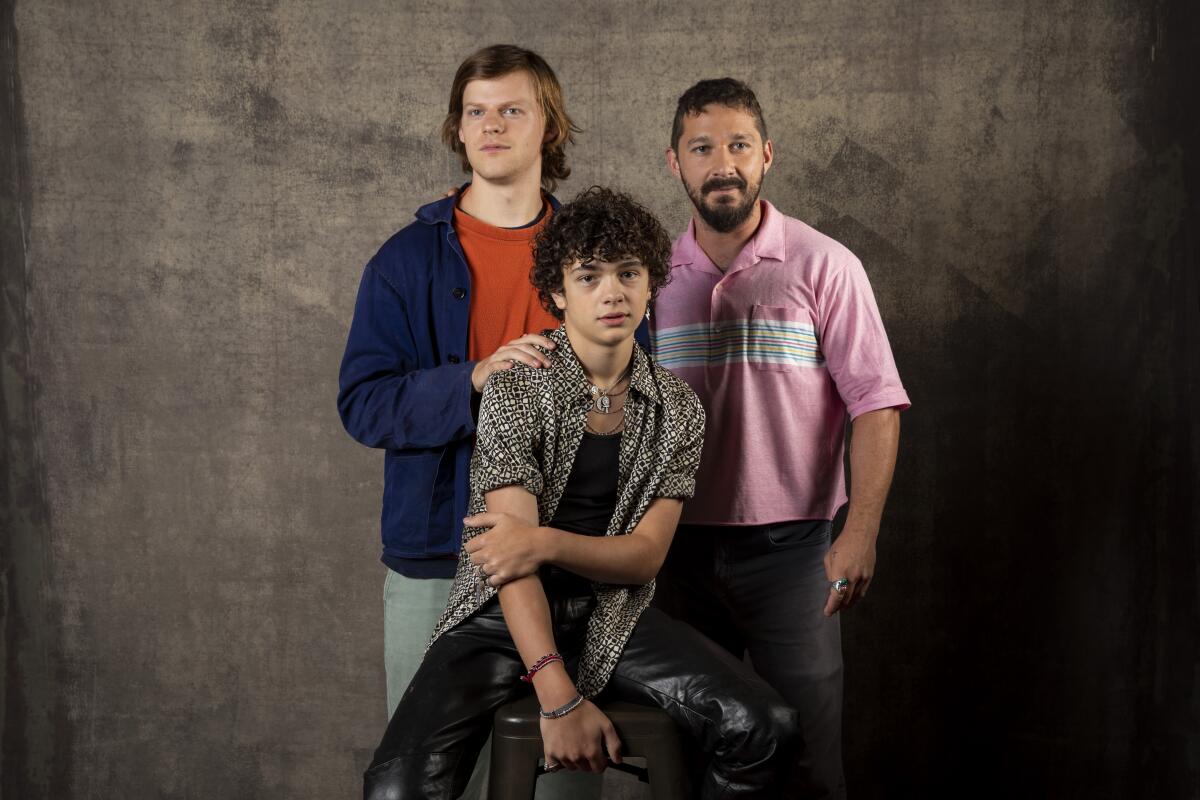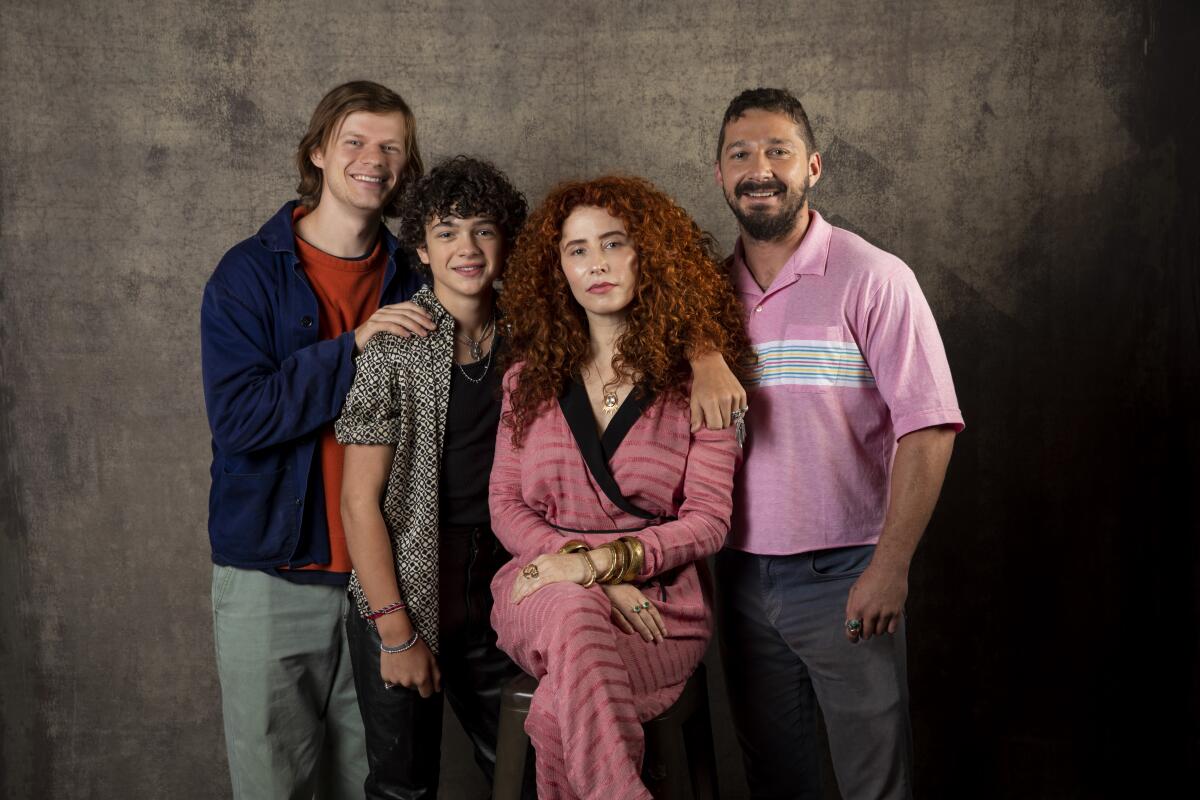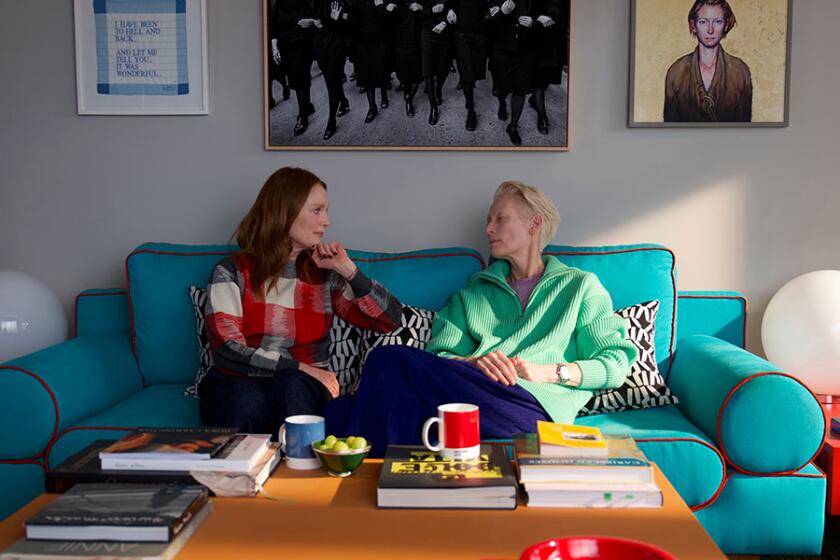How Shia LaBeouf confronts his troubled relationship with his father in ‘Honey Boy’

- Share via
It seems pretty complicated, but also kind of not.
Here’s what’s not complicated — Shia LaBeouf wrote and costarred in the raw, emotional movie “Honey Boy.” Directed by Alma Har’el, making her fiction feature debut, the movie won a special jury award for vision and craft when it premiered this year at the Sundance Film Festival. The picture opened Friday to strong reviews and earned $288,824 in four locations for one of the highest per-screen averages of the year.
Now for the complicated part — LaBeouf plays a role based on his own father, a former rodeo clown who saw his son shoot to stardom as a child actor. Noah Jupe plays Otis Lort, the “Honey Boy” version of young Shia, while Lucas Hedges plays a slightly older Otis after he has become an action star and bounces into rehab following a few brushes with the law. The complex, dysfunctional dynamic between father and son forms the film’s core.
LaBeouf — a teenage star on the Disney Channel series “Even Stevens” before rocketing to even greater fame with the “Transformers” franchise — started writing the script while in court-ordered rehab after his 2017 arrest in Georgia while shooting “The Peanut Butter Falcon.” Diagnosed with PTSD, LaBeouf confronted the traumas inflicted on him by his father and his career in the screenplay for “Honey Boy.”
As he began writing, he did not intend to appear in the movie as his father or anyone else. Sitting for an interview with Har’el, Hedges and Jupe during the Toronto International Film Festival in September, LaBeouf said he thought at the time that it was “game over” for his acting career.
From rehab, he sent pages to Har’el. LaBeouf and the filmmaker had grown close after he emailed her out of the blue upon seeing her 2011 documentary “Bombay Beach” on DVD. The pair subsequently collaborated on a music video for the group Sigur Rós, and LaBeouf executive produced Har’el’s second doc, 2016’s “LoveTrue.”
“I thought this is the part that he’s been preparing for his whole life when I read it,” Ha’rel said of the “Honey Boy” script. “The character kind of jumped out of the page and really hit me hard. It just seemed like something that has to be on-screen and not stay in the therapy room.
“And it just kind of hit me that he has to do the dad and how striking and how hard that would be. I’m always happy to hear that I’m wrong, but I’ve never seen anybody do that. I’ve never seen anybody play their father, who caused them so much of the trauma that they were dealing with, at the same time that they wrote it. So it just seemed like something that we would probably be able to do together, and it was really kind of scary in many ways to step into it, but Shia went for it.”

Shia LaBeouf wrote and stars in Alma Har’el’s “Honey Boy,” about his own childhood, also featuring Noah Jupe and Lucas Hedges.
Adding to the daring, inside-out feeling of LaBeouf’s screenplay and unsparing performance were the complications of Jupe and Hedges trying to tailor their performances to credibly seem like the same person at different ages, both performed opposite the very real person their character was fictionalizing.
“I thought before we started it’s a bit weird to be playing the person who’s actually right next to you, a younger version of them,” said Jupe, whose other credits include “A Quiet Place” and “Ford v Ferrari.” “But once we got there, Shia was very open to playing around and wasn’t at all stuck in a steady story.
“I guess maybe it was weirder with me and Lucas playing the same character. We hung out a lot and we kind of grew this character together, which Alma really helped us with. You spend this much time, both [of us] learning about this character and talking about it. And by the first week, it wasn’t weird at all anymore. It just felt like we were working and growing and building this character together as a team.”
Hedges, an Oscar nominee for “Manchester by the Sea,” said that although he and Jupe did try to come up with some physical elements they would both bring to the character, “Mostly, it was just sort of capitalizing on the genuine connection me and Noah feel towards each other and specifically, I think I’ve always wanted to feel like an older brother. And most of the kids growing up that I wanted to feel like an older brother to had no interest in feeling like a younger brother. So I think one of the things that I love about Noah is the fact that I think he genuinely loves me too.”
“Debatable,” Jupe playfully interjected.
For Har’el, Jupe and Hedges, a big part of their challenge was how much the character of Otis should mimic LaBeouf directly and how much he should be his own person. While shooting, Hedges would sometimes wear LaBeouf’s actual clothes.
“We had a lot of challenges with that, ‘How much do we stay loyal to Shia?’” said Har’el. “Shia as a person has so many people that think they know him or that have a view of him, so many photos or moments in his life have become like cultural memes.
“I was really aware that the film has to exist on a different level when it comes to the archetype of the son and father that goes beyond Shia’s bio. And it was really important for all of us to kind of communicate with that and not ignore it, but also that you can kind of wink at it sometimes. And we would really look at things as references and decide what to celebrate and what to laugh about and what to ignore.”
For LaBeouf, the process of shooting the movie was something entirely different from the rest of his collaborators, as he described many scenes as feeling like “flashbacks” to moments from his own life. Which made the actual shooting of the movie an isolating process.
“I was very lonely shooting,” said LaBeouf. “I even remember some points where I would try to connect with either [Noah or Lucas], but then they would stay in it [between takes] and sort of leave me be. Noah’s a little bit better about it, cause he was needier, cause that’s just who he was at the time in the screenplay. But I remember coming up to Lucas at times and not having a way in. Which freaked me out. And also gave me this longing that my father had towards me. So in the same way that Noah had had this longing towards me that was genuine and we would play with it, I also had a longing towards Lucas that was genuine.”
For Har’el, the making of the film has meant not only a fulfilling professional collaboration with LaBeouf but also an opportunity to see her friend grow and make genuine personal breakthroughs.
“He is just the best partner ever to have on an artistic process. He knows what he wants to do and then he really lets you do your thing,” she said. “So he never came to the editing room or was micromanaging us. And he came and saw the cut at the end and when he left he was like, ‘We did it. I think they’re going to let us put our head in a guillotine again.’ And that really hit me when he said that.
He really grew up living with the feeling that he has to be given permission... Breaking the loneliness of just being an actor that is waiting for approval has been really life-changing.
— Director Alma Har’el on collaborating with Shia LaBeouf
“He really grew up living with the feeling that he has to be given permission [to take creative risks], and my biggest wish was he will have the freedom walking out of this feeling like he doesn’t need to wait for anybody to allow him to do it. Breaking the loneliness of just being an actor waiting for approval has been really life-changing.”
LaBeouf’s father watched the film on a computer link while LaBeouf watched his father via video. Asked about the experience of finally showing the movie to his father, LaBeouf said, “It’s just the ultimate. It’s the pinnacle of my life. It’s major.”
LaBeouf sent clips of their conversation to Har’el. “It’s amazing how you’re saying the thing you wanted the most was to make him look good,” Har’el recalled to LaBeouf.
“And to not have everyone else look at my father different, but to have my father view my father different,” LaBeouf added.
“And he does view himself different,” he said, attempting to summarize what the experience of making “Honey Boy” has meant.
“And I’ve gotten lighter, but he’s gotten lighter, it’s lightened the load for both of us. And the idea that he knows that I view him this way. There were things I couldn’t actually articulate to him, that it had to come through this weird muddy route.
“And now he knows how I feel about him, because ‘I love you’ didn’t mean anything to a person who doesn’t love themselves. For me to say to my father, ‘I love you,’ it didn’t mean [anything.] My father doesn’t love my father, or didn’t then, so to hear your son say it to you didn’t matter to him. He couldn’t accept it. But as an artist, which my father is, to go and build this sculpture for a person and go, ‘Hey, man, I really love you.’ It’s like, ‘He can really feel it.’”
More to Read
Only good movies
Get the Indie Focus newsletter, Mark Olsen's weekly guide to the world of cinema.
You may occasionally receive promotional content from the Los Angeles Times.











